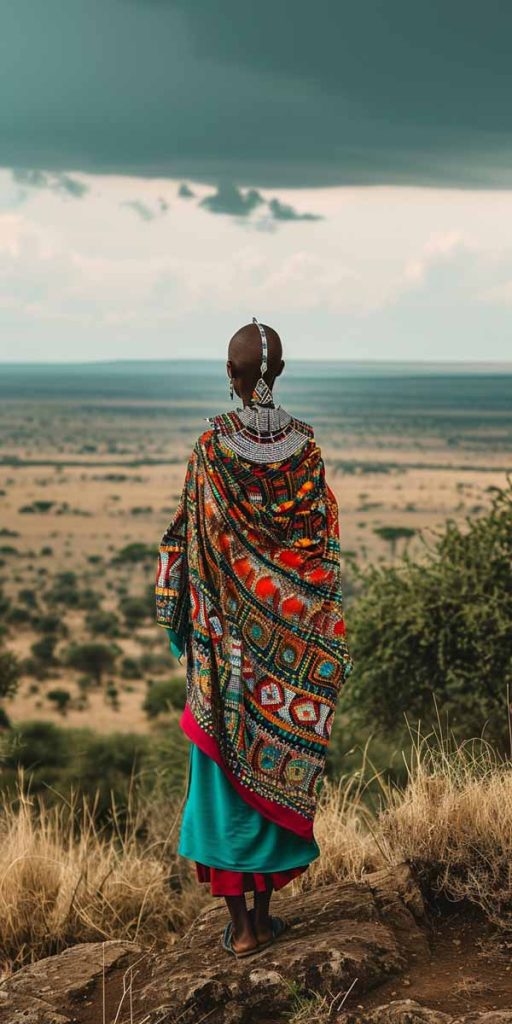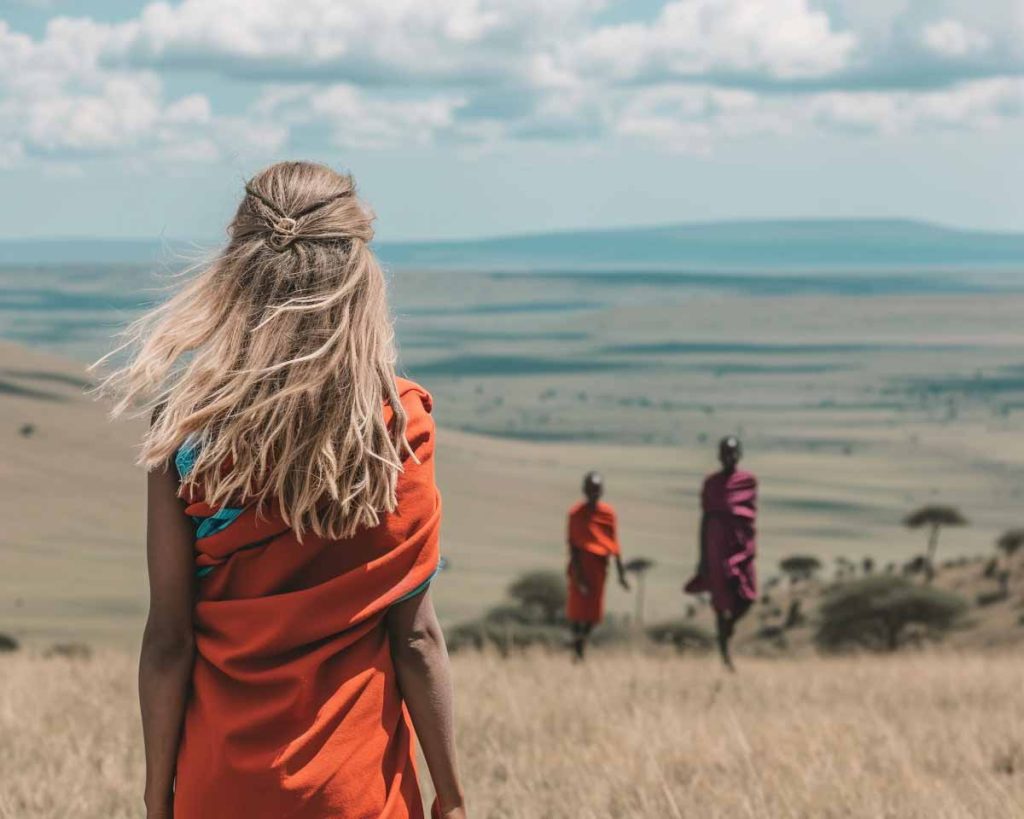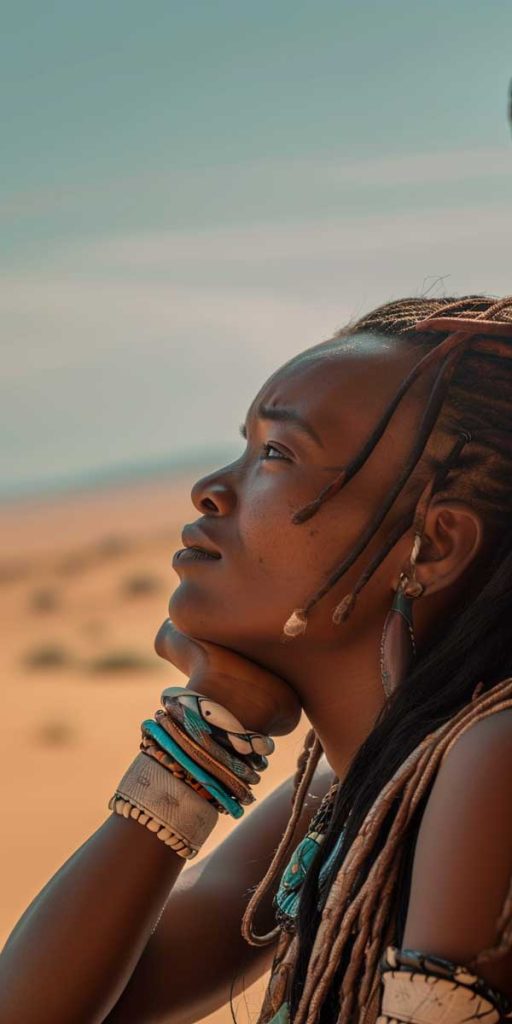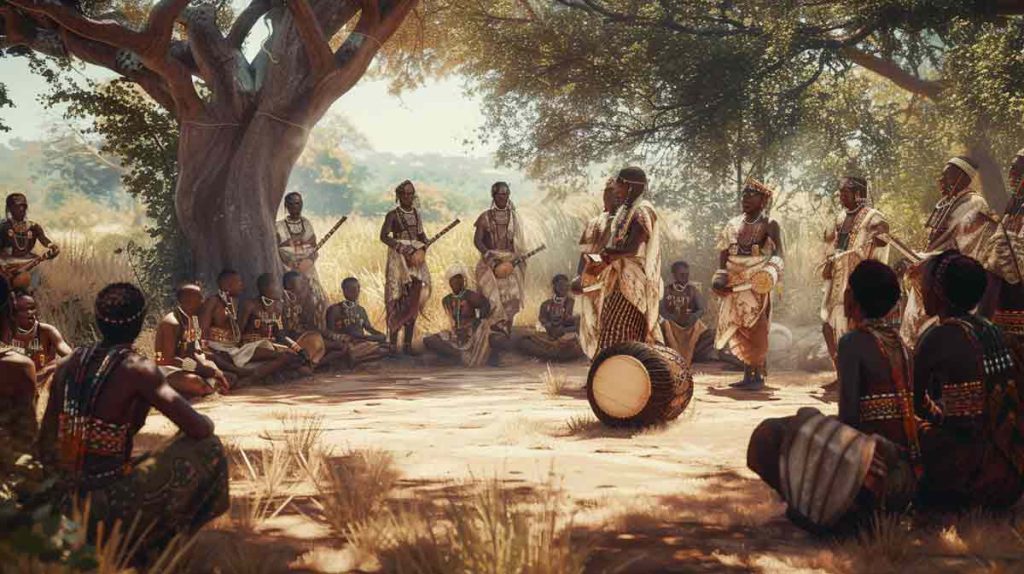Embarking on a safari across the vibrant world of Africa provides an unparalleled opportunity to witness the continent’s glorious cultural heritage. Amidst the diverse tribes and spectacular wildlife, one can encounter the profound African traditions that have shaped the very fabric of this dynamic world. Within these African traditions, one finds the heartbeat of the indigenous communities, echoing through ceremonious rituals and rich customs passed down through generations. Every journey through the savannahs and rainforests from Botswana to Tanzania unveils a myriad of African tribal customs that resonate with the spirit of African heritage.

In Botswana, the cradle of cultural rituals, travellers are introduced to the ancient legacy of tribes such as the San people of the Makgadigadi Pans and the Tswana. Here, culture and nature intertwine to reveal a tapestry of stories, beliefs, and lifestyles, each distinct in its own right. The cultural heritage of these tribes, undeterred by colonial and contemporary changes, remains vibrantly alive, offering a gateway to understanding the profound wisdom and resilience intrinsic to African societies.
Join us as we delve into the magnificence of Africa’s cultural expanse on a journey that transcends mere observation — it’s an immersive experience into the essence of a land rich in history and elemental beauty.
Key Takeaways
- Botswana signifies an extraordinary destination for experiencing ancestral African tribal customs and cultural rituals.
- The diverse tribes of Africa, including the ancient San people, have a resilience that preserves their rich traditions and cultural heritage.
- Cultural safaris are an immersive way to connect with the vibrant world of African traditions and the essence of its diverse tribes.
- Storytelling, dance, religious beliefs, and the traditional practices of tribes like the Tswana and Herero are critical aspects of the cultural heritage that visitors can observe and appreciate.
- Understanding and respecting the cultural rituals and customs of Africa’s oldest tribes is crucial for all safari-goers.
Experiencing the Maasai Tribe’s Traditions in Kenya
The Maasai tribe, a symbol of traditional African culture, offers a spectacular insight into the cultural traditions of Kenya. A safari dedicated to exploring Maasai life presents a vivid tableau of their pastoralist lifestyle, punctuated by the brilliant hues of their attire and their intimate connection with the land. To truly grasp the cultural depth of the Maasai, one must delve into their customs, which are as rich and varied as the wildlife in Africa.

Unveiling the Maasai Culture: A Window to Kenya’s Past
In the heart of Kenya’s safari landscape, the Maasai tribe’s heritage thrives, boasting African traditions that date back centuries. The nomadic Maasai, garbed in their iconic red Shukas, embody the essence of Kenya’s historied past, where their revered cattle and the stewardship of their children are integral to their identity. A journey into the Maasai realm reveals cultural practices that harmoniously blend with the savannahs of the Masai Mara and beyond.
Participating in the Maasai Rite of Passage
The rite of passage, a significant event in Maasai society, is a testament to the endurance of African cultural practices. The Adamu or jumping dance, part of this elaborate ritual, is where young men demonstrate their warrior prowess and eligibility as future husbands, leaping towards the sky. This vibrant and competitive display serves as a rite of initiation, marking the transition from boyhood to the esteemed status of Morans within the Maasai communities.
Rituals, Chants, and Maasai Healing Dance
The spiritual fabric of the Maasai is woven through their rituals and healing dances. Amidst evocative chants, the healing dance unfolds, evoking a powerful connection to the spiritual realm. Elders and healers preside over this cultural spectacle, employing rhythmic movements channelling the soul of African cultural traditions and fostering a holistic union with nature.
Exploring Maasai Communities: A Deep Dive into their Everyday Life
Visits to Maasai manyattas offer a window into everyday life in African culture. These traditional homesteads, crafted by Maasai women, are emblems of practicality and cultural ingenuity. Life here pivots around cattle tending, reinforcing the cultural items in Africa that symbolise wealth and status amongst traditional African communities.
Maasai on a Safari: Connecting with Wildlife and Nature
Interactions with the Maasai on a safari provide a unique narrative of conservation and cohabitation with African wildlife. Their ancestral knowledge spills into the savannah, enhancing the safari experience with insights into animal behaviour and environmental awareness. This profound respect for their natural surroundings positions the Maasai as custodians of the land, and a safari amidst their presence is an authentic testament to African culture and traditions.
A Maasai safari is more than an encounter; it’s an education in the resilience and beauty of African tribes and the environments they inhabit. From the piercing clarity of a Maasai warrior’s gaze across the grasslands to the measured steps of a ritual dance, these experiences are memorable portraits of a rich cultural tapestry etched against Kenya’s majestic landscapes.
A Closer Look at the Himba Tribe of Namibia
Amidst the arid landscapes of Namibia, the Himba tribe emerges as a fascinating embodiment of African cultural practices. Preserving the traditions of their ancestors, the Himba offer a window into the evolving tapestry of traditional African cultures. In a world where modernity constantly encroaches upon ancient ways of life, the Himba stand as stewards of history, persisting with customs that have shaped their identity for centuries.

The Fascinating Culture of the Himba Tribe
The Himba tribe, residing in the Kunene region of Namibia, represents a legacy of resilience and cultural pride. Their pastoralist lifestyle and distinctive customs vividly portray traditional African culture. As one traverses the Himba lands, the ever-present swirls of smoke from sacred fires remind visitors of the tribe’s profound connection to the Himba tribe spirit world and its ancestral heritage.
The Himba Tribe’s Courtship Traditions
In the Himba tribe’s courtship, the dance of love and partnership is guided by rituals deeply rooted in their society. The ‘Okujepisa Omukazendu, ‘ a ceremony where prospective brides adorn themselves to announce their readiness for marriage, epitomises traditional African rituals. The expression of desirability and fitness for marriage underscores the importance of this life event within their close-knit communities.
Traditional Pastoralist Lifestyle of Himba Tribe
The Himba’s nomadic pursuit of sustenance across Namibia’s challenging terrains underpins their pastoralist way of life. Their movement with herds of goats, sheep, and cattle under the sun exemplifies the Himba pastoralist lifestyle. This existence, deeply woven into the fabric of African culture, is a testament to the tribe’s ingenuity and intimate knowledge of the land.
Learning about Beauty Norms and Ochre Bodypaint among Himba People
Beneath the African sun, the Himba people’s skin radiates with the burnished glow of otjize, a mixture symbolising beauty and social standing. The red ochre bodypaint, a hallmark of their identity, serves aesthetic and pragmatic purposes, protecting their skin from the harsh climate. Thus, African beauty norms are uniquely expressed in the Himba’s daily life, resonating with ancestral values and environmental practicalities.
Himba Tribe and Their Connection with the Spirit World
For the Himba, the fabric of the living is intricately interwoven with the spirit world. They partake in rituals that honour and invoke the guidance of their ancestors, reflecting a deeply entrenched aspect of African traditions and customs. The Okonkwo, the Himba’s sacred fire, remains an eternal flame of spiritual communion, bridging the gap between the human and the celestial.
Immersing oneself in the Himba tribe’s society offers unparalleled insight into traditional African cultures. Their steadfast adherence to the ways of old, from African cultural items to their pastoralist ventures, reveals a people rich in heritage and unwavering spirit. The Himba’s continued embrace of their customs ensures that African cultural practices in Africa remain a memorable chapter in the continent’s grand narrative.
Experiencing Traditional African Cultures: The Ndebele Tribe
Delving into the heart of traditional African cultures, we find ourselves wrapped in the vibrant tapestry of the Ndebele tribe’s life in South Africa. Renowned for its striking Ndebele art and resilient customs, the community maintains a rich heritage despite their evolving world. Their artistic legacy — expressed through geometric patterns and vivid colours — adorns their homesteads and garments, echoing the pulse of African heritage and traditional African cultures.
The Colorful World of Ndebele Art and Beadwork
Ndebele art is an enchanting visual language that communicates the narratives and cultural vitality of the tribe. Flourishing with geometric patterns and intense colours, the murals on their homes and the intricate African beadwork worn by the tribe members are more than mere adornments; they are symbols of identity and communal ties. These artistic expressions mirror Ndebele’s life, conveying the essence of African customs and traditions through their distinct aesthetic.

Discovering the Ndebele Initiation Rites
Profound African rites of passage signpost the Ndebele’s journey from childhood to adulthood. The initiation rites, an education in tribal customs and history, impart important moral codes and skills necessary for community integration. Celebrated through elaborate ceremonies, these rites highlight the significance of transitioning to social maturity within their tribal dynamics. They are a pivotal chapter in the chronicles of African cultural practices.
The Cultural Traditions and Ceremonies of the Ndebele
Each ceremony in the Ndebele life cycle, whether marriage or harvest, is steeped in profound symbolism and carried out with pageantry, including song, dance, and elaborate dressing. These Ndebele ceremonies maintain the historical narrative and strengthen the social fabric within the tightly-knit community, showcasing African cultural traditions with resistance and fluidity amidst the changing tides of time.
Living with the Ndebele: Tribal Life Away from Western Influence
In the serene locale of ornamental dwellings that shield them from Western influences, the Ndebele have retained their unique African cultural patterns and practices. We observe the perpetuation of ancient customs and adept craftsmanship through generations, reflecting the Ndebele’s dedication to upholding their heritage. Their life is a narrative of African tribal customs that have survived and thrived, even in the face of modernisation.
Fascinating Tribal Traditions of the Ndebele: Surviving amidst Change
The adaptability and creativity of the Ndebele tribe exemplify the enduring spirit of African tribal culture. Their traditions, particularly their iconic artwork and beadwork, have garnered international acclaim, signifying their cultural importance on a global stage. Despite the pressure of contemporary society, the Ndebele community prevails in celebrating and holding steadfast to their Ndebele traditions, serving as a vibrant illustration of the resilience ingrained in traditional African cultures.
FAQ
What role do traditional African tribes play in their respective communities?
Traditional African tribes play an integral part in their communities, often serving as healers, elders, and spiritual leaders. They also contribute to preserving cultural practices, provide guidance in social and spiritual matters, and act as mediators in conflict resolution.
How do African tribes express their cultural identity through music and dance?
African tribes express their cultural identity through various forms of musical expression and dance deeply rooted in their traditions. These music and dance forms are often used in rituals, ceremonies, and celebrations. They may serve as a means of storytelling or spiritual practice.
How do African tribes interact with nature and wildlife in traditional practices?
African tribes deeply connect with nature and wildlife, often incorporating them into their traditional practices. For example, the Maasai people of Kenya dance with fire to ward off evil spirits. In contrast, the San people of southern Africa have a strong spiritual connection to the wildlife in the region.
What is the significance of hospitality in African tribal traditions?
Hospitality is a significant aspect of African tribal traditions, as it is considered a fundamental value in many African cultures. Hosts are expected to go a long way to ensure the comfort and well-being of their guests, reflecting the importance of community and interconnectedness within tribal societies.
What are some examples of African tribal art and its role in tribal traditions?
African tribal art, including masks, sculptures, and textiles, is significant, culturally and spiritually crucial within tribal traditions. These artistic expressions often convey spiritual and symbolic meanings, visualising the tribe’s beliefs, history, and connection to the natural and supernatural world.
How do African tribal traditions honour the cycle of life, including birth, death, and rebirth?
African tribal traditions have unique customs and rituals that honour the cycle of life. For example, the Himba of Namibia celebrates the birth of new lives with traditional ceremonies. At the same time, the Maasai people of Kenya have specific rituals associated with funeral customs, reflecting the tribe’s beliefs about life, death, and the afterlife.
